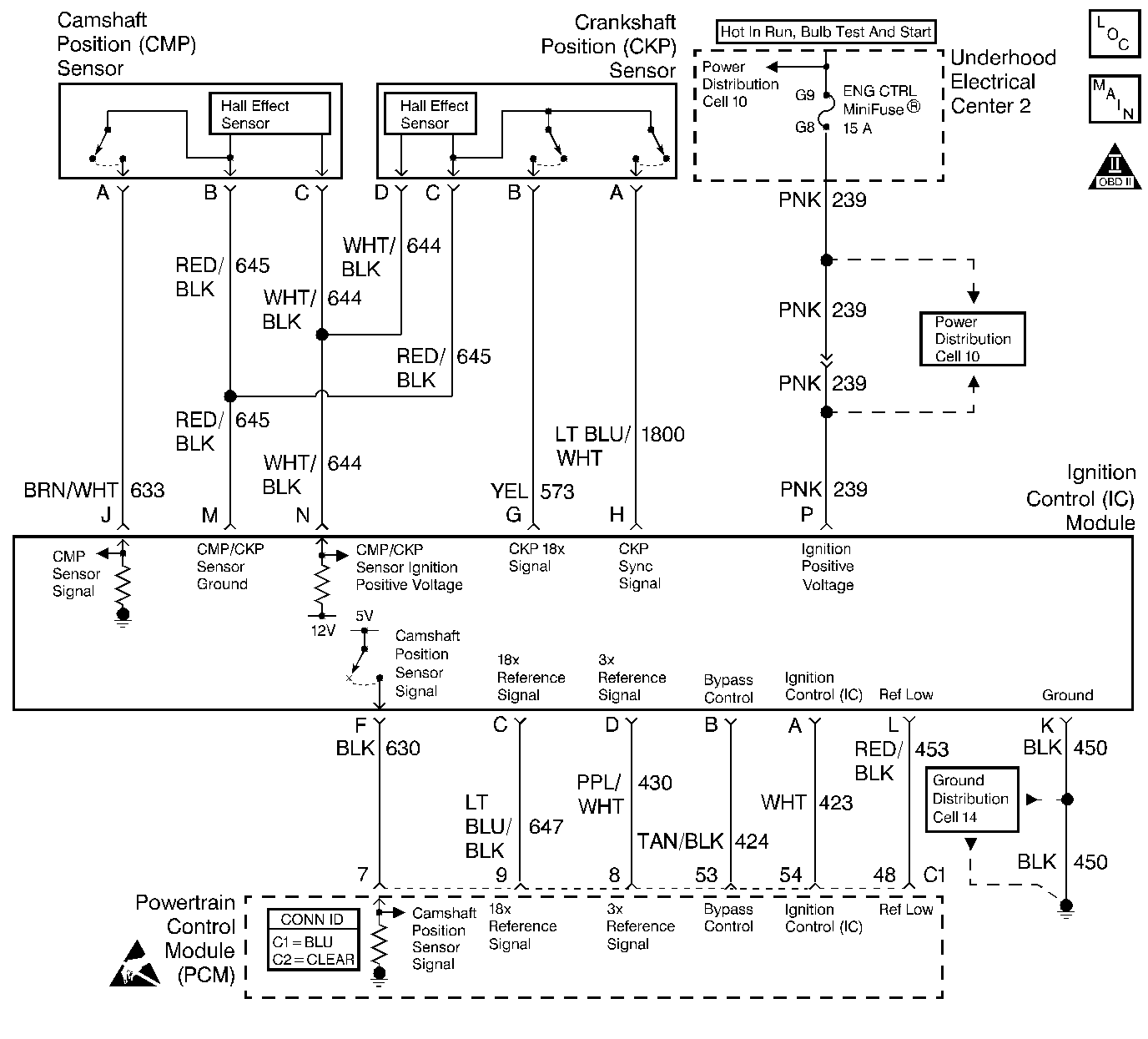
Circuit Description
The Ignition Control Module (ICM) sends signals that the PCM requires for fuel control and spark advance calculations. At the start of engine crank, the ICM controls spark advance (Bypass mode.) When the second 3X reference pulse is recognized by the PCM, the PCM applies 5 volts to the Bypass circuit, commanding the ICM to switch spark advance to PCM control (IC mode). If the PCM detects a short to voltage in the Bypass circuit, DTC P1362 will set. A short to ground in the IC circuit or Bypass circuit will cause both DTC P1361 and DTC P1362 to set. The engine will start and may run in Bypass mode timing.
Conditions for Running the DTC
The engine is running.
Conditions for Setting the DTC
| • | The PCM detects a short to voltage in the Bypass circuit. |
| • | The conditions is present for 300 3X reference periods (100 crankshaft revolutions). |
Action Taken When the DTC Sets
| • | The PCM will illuminate the malfunction indicator lamp (MIL) during the second consecutive trip in which the diagnostic test has been run and failed. |
| • | The PCM will store conditions which were present when the DTC set as Freeze Frame and Failure Records data. |
Conditions for Clearing the MIL/DTC
| • | The PCM will turn OFF the MIL during the third consecutive trip in which the diagnostic has been run and passed. |
| • | The History DTC will clear after 40 consecutive warm-up cycles have occurred without a malfunction. |
| • | The DTC can be cleared by using the scan tool. |
Diagnostic Aids
Check for the following conditions:
| • | Poor connection at the PCM. |
| Inspect harness connectors for backed out terminals, improper mating, broken locks, improperly formed or damaged terminals, and poor terminal to wire connection. |
| • | Damaged harness. |
| Inspect the wiring harness for damage. If the harness appears to be OK, disconnect the ICM, turn the ignition ON and observe a digital multimeter connected between the IC circuit and B+ while moving connectors and wiring harnesses related to the ICM. A change in voltage will indicate the location of the malfunction. |
Reviewing the Freeze Frame/Fail Records vehicle mileage since the diagnostic test last failed may help determine how often the condition that caused the DTC to be set occurs. This may assist in diagnosing the condition.
Step | Action | Value(s) | Yes | No |
|---|---|---|---|---|
1 | Did you perform the Powertrain On Board Diagnostic (OBD) System Check performed? | -- | ||
2 | Is DTC P1361 set also? | -- | ||
3 |
Does the test lamp illuminate? | -- | ||
4 |
Does the test lamp illuminate? | -- | ||
5 | Repair the short to voltage in the BYPASS circuit. Refer to Wiring Repairs . Did you complete the repair? | -- | -- | |
6 |
Does the test lamp illuminate? | -- | ||
7 | Repair the short to ground in the IC circuit. Refer to Wiring Repairs . Did you complete the repair? | -- | -- | |
8 |
Does the test lamp illuminate? | -- | ||
9 | Repair the short to ground in the BYPASS circuit. Refer to Wiring Repairs . Did you complete the repair? | -- | -- | |
10 |
Did you find and correct the condition? | -- | ||
11 |
Does the voltage toggle between the specified ranges? | 20mV-40mV 150mV-250mV | ||
12 | Replace the ICM. Refer to Ignition Coil Replacement . Did you complete the replacement? | -- | -- | |
13 |
Important: The replacement PCM must be programmed. Refer to Powertrain Control Module Replacement/Programming . Replace the PCM. Did you complete the replacement? | -- | -- | |
14 |
Does the DTC reset? | -- | System OK |
